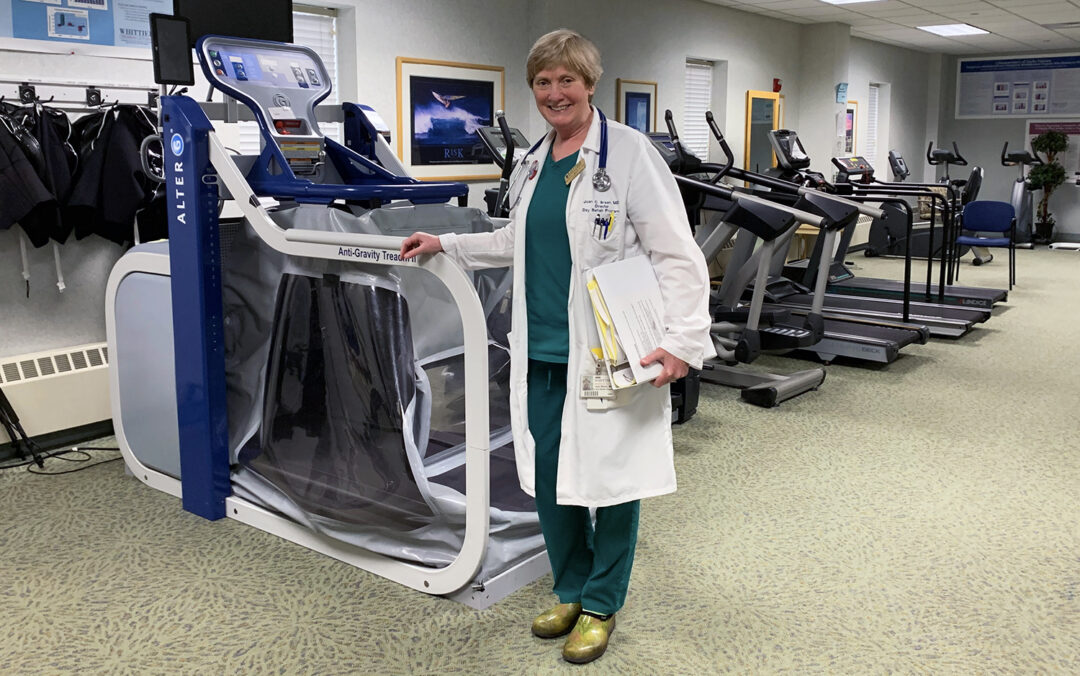A graduate of Harvard College and Dartmouth Medical School, Dr. Joan Breen completed her internship in internal medicine at Brown University with a residency at Miriam Hospital and her neurology residency and fellowship in cerebrovascular disease at Tufts-New England Medical Center. Dr. Breen was formerly the medical director of the Neurology Day Rehabilitation Program at Portsmouth Regional Hospital and medical director for the Seacoast Visiting Nurse Home Health Agency in North Hampton, New Hampshire. Dr. Breen has led Whittier’s Stroke Rehabilitation Program since 2007.
Dr. Breen was always interested in neuroscience and neurological medicine. “When I decided to go to medical school, I first wanted to do child neurology,” she says. “Then I took a stroke fellowship after my neurology fellowship to do different types of research. That led to me joining a private practice in Boston. At the time, I was the only doctor north of Providence with a subspeciality stroke, so I quickly accumulated many stroke and neurology patients. We had family around Portsmouth, New Hampshire, so my family chose to move and started at Portsmouth Hospital, where I first had the notion of starting an outpatient, intensive rehabilitation program for stroke patients.”
Where did the idea come from? “While I was taking care of these patients, I started to see and realize that people would continue to improve months and years after their strokes if they continued with good rehab. This wasn’t what I was taught. If someone had a stroke, the thinking was that you were born with a certain number of brain cells, and if they died, there was no regeneration, no neuroplasticity. You were just supposed to teach compensatory strategies. You would keep them in the bed, very developmentally based, like a baby. A person with a big stroke would never walk again, so you would never even have them try.”
“But I started to notice how patients were so motivated and supported by their families. So, I would say: ‘Okay, let’s see what happens!’ This ran concurrent to new research in the late 1990’s studies on occupational and physical therapy recovery. Neuroplasticity was starting to be studied; now it’s mainstream, but back then, there wasn’t much.”
“Portsmouth is an acute care hospital, but I wanted more equipment and emphasis on rehabilitation. So, in 2007, I left the practice and came to Whittier Health Network, so I could continue to work on rehab, and I’ve been here ever since!”
Whittier’s Community-Based Outpatient Stroke Rehabilitation Program is focused on improving the functional outcomes of neurologic patients living in the community. By successfully combining blood pressure, cardiovascular risk factor education, and treatment with rehabilitation, the goal is to maximize return to work, driving, community re-entry, blood pressure control, endurance, mood, and overall stroke recovery.
What’s in the future for Dr. Breen and the Stroke Rehabilitation program? “I would love to start a telehealth program; there’s so much opportunity now to team up with some of the centers in Boston. We’re also teaming up with Boston University in their language speech study! BU has one of the best rehab training programs in the country; they also have a speech pathology research center and a free aphasia clinic you can send people to. A few years ago, I met Dr. Swathi Kiran, a speech professor at BU, conducting an aphasia study, enrolling bilingual college and high school seniors with traumatic brain injury (TBI) in an intensive year-long program to get back into higher education. These students speak English and Spanish, so sessions are provided in both languages, and a computer model is being built to determine if people need to be treated in their primary language.”
“One of the things I’m passionate about is how the overall healthcare system is such a rush; the only thing people are concerned about are living and dying,” Dr. Breen continues. “Then in inpatient rehab, people are concentrating on physical recovery so they can just get home. But when they get home, they realize that they still have some level of deficit of disability; they’re not functioning at their pre-stroke level.”
“At Whittier, we combine the rehabilitation, the coordination of care, and healthy lifestyle education, which is unique in the field. Whittier’s been a great space to work because we can follow the patients through their full continuum of care and keep them on track. The Arcidi’s have really facilitated a team and program that runs like an inpatient unit, the greatest way for these patients to be treated, in my opinion.”
For referrals or more information about Whittier Rehabilitation Hospital Bradford’s services, visit their page on our website.




